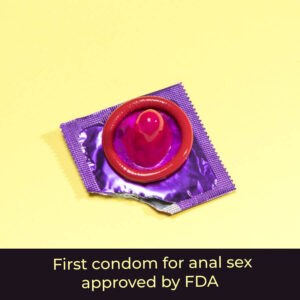Summary: The first condom designed for anal sex
The One Male Condom is the first condom specifically designed for anal intercourse. The FDA has approved it because of its effectiveness in preventing the spread of STDs during anal sex.
As a birth control method, it has been approved for use during vaginal activity to lower the risk of getting an STD. Anal intercourse has a “much higher” risk of STI transmission than vaginal intercourse. Dr. Will DeWitt, clinical director of anal health at the Callen-Lorde Community Health Center in New York City, says condoms for anal intercourse could be a useful tool for HIV/AIDS prevention.
He believes that the One Male Condom brand and marketing may turn off people who have sex but do not see themselves as men, or at least men’s ideals. “Even if it’s from the standpoint of who has to wear the condom, it’s not simply male bodies and male-identified people who need to use it,” he adds. As DeWitt put it, “Anal sex is for everyone.”
The first condom specifically designed for anal sex has been approved by the FDA.
The One Male Condom will be the first to get a label saying that it can be used “safely and effectively” to stop sex-related infections.
Researchers believe that a woman may have been cured of HIV. The FDA has authorized the first condom specifically designed for anal intercourse.
This condom, like hundreds of others, isn’t revolutionary, but it is the first to be given the coveted “safe and effective use” label because of its effectiveness in preventing the spread of STDs during anal sex. As a birth control method, it has also been approved for use during vaginal activity to lower the risk of getting an STD.
Davin Wedel, founder and president of One Male Condom manufacturer Global Protection Corp, said in a statement: “This landmark move proves that researchers, advocates, and companies working together can generate a lasting influence on public health efforts.”
Anal sex data is the first time condoms have been certified for use, with more than 300 condoms already on the market for vaginal sex.
Anal intercourse has a “much higher” risk of STI transmission than vaginal intercourse, according to the director of the FDA’s Office of GastroRenal, ObGyn, General Hospital, and Urology Devices.
Anal intercourse condoms may be more likely to be used if the FDA approves a condom expressly designed, evaluated, and labeled for this purpose, Lias said in a statement. It also helps us achieve our goal of improving health equity by developing safe and effective products that can be used by a wide range of people.
The risk of HIV transmission through anal sex is approximately 18 times greater compared to the risk of HIV transmission from sexual intercourse with a receptive vaginal sex partner. Of the 36,801 new HIV/AIDS diagnoses in the United States in 2019, 69% were gay or bisexual men, according to the Centers for Disease Control and Prevention (CDC).
More than three-quarters (76%) of these new diagnoses were made by queer black, Latino, or Native American men. Only 25% were created by white men. One Male Condom offers standard, thin, and fitting condoms in 54 different sizes.
For anal sex, 0.68 percent of the One Male Condoms failed, whereas for vaginal sex, 1.89 percent of the condoms failed, according to the FDA, which defined condom failure as slippage or rupture of the condom.
According to Dr. Will DeWitt, clinical director of anal health at the Callen-Lorde Community Health Center in New York City, could be a useful tool for HIV/AIDS prevention.
People would be encouraged to use condoms for anal intercourse if they were more willing to do so, according to DeWitt. “For those who cannot or do not want to utilize PrEP, condoms remain an important tool.”
The daily tablet version of pre-exposure prophylaxis, or PrEP, is the most common method of preventing HIV/AIDS infection in those who have not yet been diagnosed with the virus. There is now a two-monthly injectable PrEP shot that was approved by the FDA last year.
Even though he said that the One Male Condom brand and marketing could turn off people who have sex but don’t see themselves as men, DeWitt is worried.
As DeWitt put it, “Anal sex is for everyone.” “Even if it’s from the standpoint of who has to wear the condom, it’s not simply male bodies and male-identified people who need to use it,” he continues. ”
Even though doctors have been telling people to use condoms for a long time to avoid getting sexually transmitted infections (STIs) during oral sex, DeWitt said FDA approval was long overdue.
Since the HIV epidemic began more than three decades ago, “here we are in 2022, and we are only now getting condoms authorized for anal intercourse,” added DeWitt. That we’ve had to wait this long for this kind of formal recognition is a little discouraging. “
